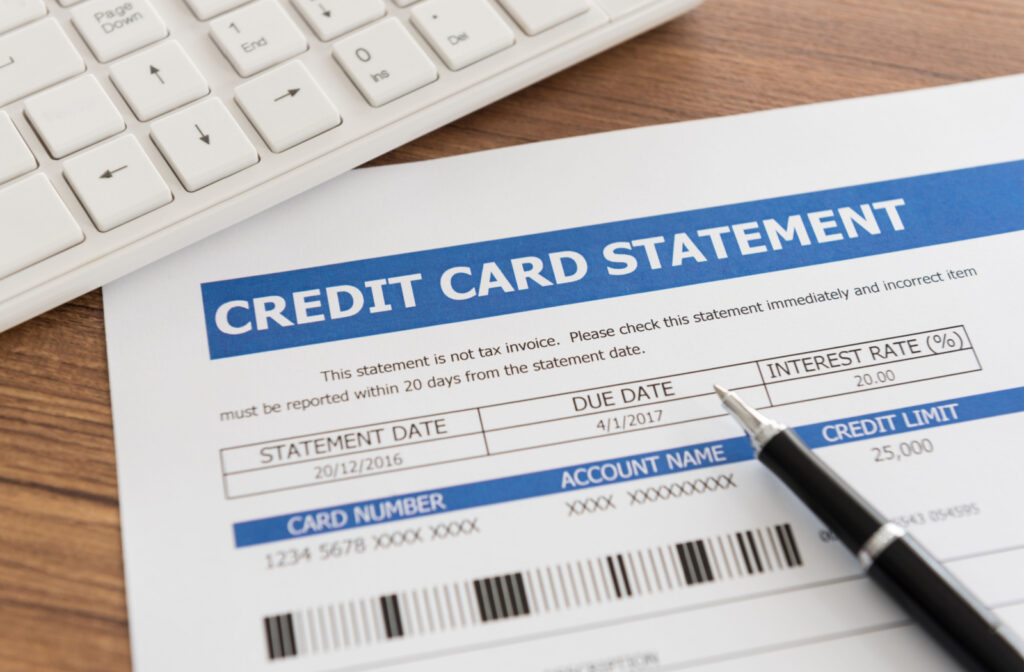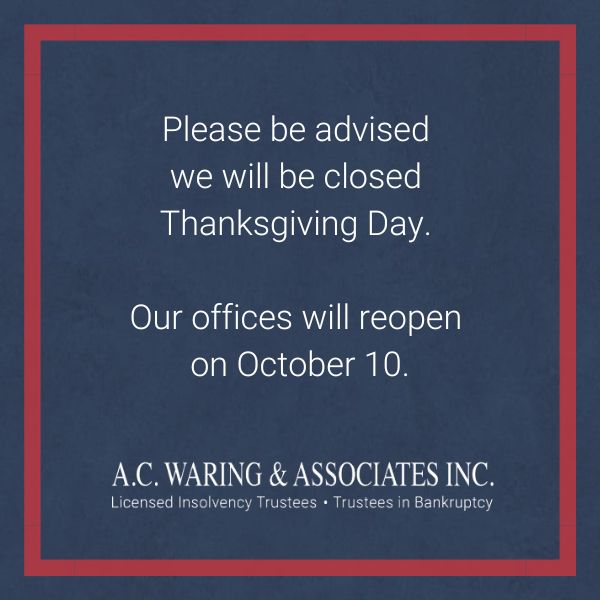Wage garnishment in Alberta is slightly different from other provinces. In this article, we’ll review some frequently asked questions and facts around wage garnishment, including:
- Your rights
- Whether creditors can garnish your wages and how much
- How to stop wage garnishment
- An employer’s responsibilities and obligations
The factors leading to wage garnishment vary from person to person, from unpaid credit card debt to outstanding personal loans or mortgage balances.
We may only be able to answer some of your questions about wage garnishment in this article. However, one of our professional associates at A.C. Waring & Associates can sit down with you to review your situation and go over your options.
What Is Wage Garnishment?
Wage garnishment is a legal process where a portion of your wages can be withheld to repay debts or meet other financial obligations. Most creditors will only resort to wage garnishment when a debtor has failed to make payments for quite some time or after they have tried and failed to work out another repayment arrangement that both parties find acceptable.
Your creditor may turn to the court for assistance and look at wage garnishment if it appears unlikely that you can begin servicing your debt again. Once the court grants your creditor a judgment recognizing they have a claim against you for unpaid debts, they can begin the garnishment process.
Alberta Wage Garnishment Rules
Wage garnishment is a government-regulated process, and the rules specific to Alberta are as follows:
- Exempt amounts in Alberta: The first $800 of your monthly income cannot be garnished. The creditor can garnish 50% of your income between $800 and $2,400.
- Dependents: The above exception limits are increased by $200 for each dependent you have.
- Unemployment: Your creditor may garnish funds directly from your bank account if you are unemployed.
The above provincial exemptions do not apply:
- If you owe money to the Canada Revenue Agency (CRA).
- If you are self-employed. Creditors can garnish 100% of self-employed wages. However, most creditors will only take a reasonable amount to prevent the individual from switching jobs.
Frequently Asked Questions About Wage Garnishment
Wage garnishment can be a complicated process. We will do our best to answer your questions here, but we are happy to discuss your situation more with you directly.
Can Creditors Garnish Wages in Canada?
Creditors can garnish wages in most parts of Canada, but the extent varies by province. Wage garnishment is not typically the first attempt at debt repayment because creditors must file a lawsuit and get a judgment from the court to garnish your wages.
What Are My Rights?
A creditor cannot garnish your wages without a court order unless they are a credit union (which requires an assignment of wages, not a court order) or are the CRA. A court order is not legally required if your wages are being garnished for child support, back taxes, or student loans.
The first $800 of your paycheque cannot be garnished, and some pensions, including the Canada Pension Fund, cannot be garnished at all. Your collector is also not allowed to pursue a non-judgment debt where the last payment or written acknowledgment of the debt is more than six years old.
Creditors are also bound to certain “cans and cannots.” They:
- Cannot contact you before 7 AM or after 10 PM Alberta time.
- Cannot use threatening, profane, or intimidating language.
- Cannot discuss your debt with anyone but you, the creditor, or someone you have given express permission to act as your representative.
- Cannot involve the police.
- Can contact you at work unless you have made alternative arrangements to discuss your debt and asked them not to contact you at work.
How Much of My Wage Can Be Garnished?
The amount of wage garnishment is determined by your income. The first $800 you earn each month is protected and cannot be garnished. Any income between $800 and $2,400 can be garnished by 50%. Any amount over $2,400 can be subject to garnishment at a rate of 100%.
What Type of Debt Is Applicable for Wage Garnishment?
Creditors can garnish your wages to pay off various debts, including child support, unpaid bills, student loans, back taxes, defaulted loans, alimony, family support payments, and credit card debt.
Most creditors must successfully sue you to garnish your wages, but credit unions and the CRA do not. Child support, alimony, and family support payments automatically include wage withholding orders, so your ex-spouse does not need to sue you to have your wages garnished.
What Is the Maximum Wage Garnishment Amount?
There is no maximum amount of wage garnishment in Alberta. However, your creditor can only garnish your wages until your debt is paid off, and the first $800 of your monthly income is protected.
How Can I Stop My Wages From Being Garnished?

There are a few things you can do to stop your wages from being garnished:
- Seek professional financial advice from a Licensed Insolvency Trustee.
- Contact your creditor and try to negotiate a new payment plan.
- Apply for a personal loan to pay off your debts in full instead of having your wages garnished.
- Quit your job, then you have no wages to garnish—this is a legal option but may complicate your financial situation more.
- Consider filing a consumer proposal to set up payment arrangements for your creditors.
- Consider filing for personal bankruptcy.
Can My Assets & Bank Accounts Be Frozen?
Creditors typically only pursue wage garnishment if you have insufficient assets to cover your debts (some assets are exempt and cannot be seized to pay off debts). If you are currently unemployed, your creditors may garnish funds directly from your bank account.
Your creditor may have your bank account frozen over unpaid debts, but they must first obtain a judgment against you and a court order to freeze your accounts. The CRA can freeze your bank accounts without a court order and may do so to force you to deal with your outstanding tax debts.
Frequently Asked Questions About Wage Garnishment for Employers
Wage garnishment does not necessarily negatively affect an employer. But there are a few things to keep in mind as an employer who has been ordered to garnish wages.
What to Do If You Are Told to Garnish Your Employee’s Wages
If you receive an official notice—either a court order, an assignment of wages agreement from a credit union, or a wage garnishment order for back taxes from the CRA—you are legally obligated to follow through with the demands outlined in the notice.
If your employee owes tax debt, you may also be held personally liable if you do not garnish the requested amounts, so it is in your best interest to comply with the terms laid out in the official notice.
What to Do If Your Employee Asks You to Stop
You must continue to garnish your employee’s wages in full until their debt is completely paid off, or they renegotiate the garnishment with their creditors. Employees may go to court and request that the amount garnished be reduced due to financial hardship. However, until you receive an official notice directing you otherwise, you must continue following the garnishment instructions in the official notice.
Employer Responsibilities & Obligations
When you receive an official notice, it will provide important details regarding your employee’s outstanding debt and the necessary steps for wage garnishment. The notice will specify the amount owed and guide you in calculating the garnished amount from each paycheck. It will also instruct you on where to send the funds that have been garnished.
To implement wage garnishment correctly, follow these steps:
- Calculate your employee’s earnings as you usually would.
- Deduct the required amount for garnishment from their total earnings before issuing them a paycheck with the remaining balance.
- Follow the instructions in the notice to send the garnished funds to the designated court.
You cannot terminate an employee, reduce their hours, or take punitive actions solely based on their wage garnishment status.
Discuss Your Situation with a Licensed Professional
Having your wages garnished can be frustrating and embarrassing and can impact your quality of life and general well-being. A Licensed Insolvency Trustee, such as A. C. Waring & Associates, can help you navigate wage garnishment, help you know your rights, and help you work with creditors to find a solution that satisfies both parties.
We do not require appointments for consultations or financial advice and offer services in English, French, Vietnamese, and Farsi. Visit us at our office, 410-10665 Jasper Ave NW in Edmonton, AB.





